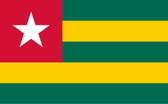
Call 0330 880 3600 Calls may be monitored or recorded. Opening Times.
- TRAVEL INSURANCE
- COVID-19 COVER
- More Options
- Help & Advice
- Existing Customers

Call 0330 880 3600 Calls may be monitored or recorded. Opening Times.

Need help?
UK Customer Services0330 880 3600*
Open Monday to Friday 9:00am to 6pm, Saturday 8:30am to 4pm and closed Sundays.
*Calls are recorded for training and quality purposes.

Official name: Togolese Republic
Capital city: Lomé
Languages spoken: French, Ewe, Kabye
Population: Around 8.5 million
Currency: West African CFA franc (XOF)
Time zone: GMT+0
Driving side: Right
Climate: Tropical, with a wet season (April–July, Sept–Nov) and a dry Harmattan season (Dec–Mar)
Togo is a narrow strip of land in West Africa offering golden beaches, bustling markets, and lush highlands. Lomé, the capital, is known for its vibrant nightlife and craft stalls, while the interior features coffee and cocoa plantations, waterfalls, and cultural traditions rooted in West African heritage.
Travellers should be aware that political demonstrations sometimes take place in Togo, especially in Lomé, and can turn violent without warning. Same-sex relationships are criminalised, and LGBTQIA+ travellers may face discrimination. Women are expected to dress modestly in rural areas. Visitors should exercise caution and avoid large gatherings.
Togo is bordered by Ghana to the west, Benin to the east, Burkina Faso to the north, and the Gulf of Guinea to the south. Though small in size, it offers varied landscapes: sandy coastline, wooded savannah, and hilly plateaus. The highest peak, Mount Agou, lies in the southwest, while the Mono River runs through the southeast.
Lomé–Tokoin International Airport (LFW) is the main gateway, with connections to Europe and neighbouring African countries. Travel within Togo is usually by bus, shared taxi, or motorbike taxi. Roads in cities are reasonable, but rural infrastructure is poor, and travel at night is unsafe. Key attractions include Koutammakou (a UNESCO World Heritage site with traditional clay houses), Fazao-Malfakassa National Park, and the lively Lomé Grand Market.
UK nationals require a visa to enter Togo, which can be obtained online (e-visa) or on arrival at Lomé airport. Passports must be valid for at least six months. The UK has no embassy in Togo; consular support is provided by the British High Commission in Accra, Ghana.
The West African CFA franc (XOF) is the official currency. ATMs are available in Lomé but can be unreliable elsewhere. Credit cards are rarely accepted outside international hotels, so cash is essential. Currency exchange should only be carried out at banks or authorised bureaus.
Healthcare in Togo is limited, particularly outside Lomé. Even in the capital, hospitals often lack medicines and equipment. Comprehensive travel insurance, including medical evacuation, is essential. Yellow fever vaccination is required for entry, and malaria is widespread, so prophylaxis and mosquito protection are vital. Tap water is not safe to drink - bottled or boiled water should always be used.